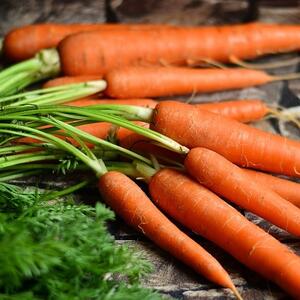When carrots get old, they become soft and rubbery. If you try juicing these, not only will you not get any juice, but you could easily damage your juicer. This is because the carrot cannot be crushed by the auger. Instead, it wraps around the auger and is forced against the juicing screen. With nowhere to go and immense pressure creted from the torque of the auger, something has to give. Unfortunately that "something" is usually the screen or even the entire juicing chamber, which cracks under the strain. So make sure to only juice hard carrots, and as soon as possible after buying.
Tip: If the carrots have lost some of their hardness, try soaking them in water. They will absorb some of the liquid and will give a better yield. But if they are rubbery at all, don't juice them. You can still use those soft carrots in soup.






